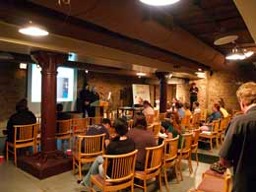Were it not for three notable events that shared a common thread, it might have been an ordinary Saturday morning during the summer of 2007.
 The first of these events occurred in California where some 200 invited attendees descended upon the Google campus to attend the second annual ‘Science Foo Camp,' a conference that draws together leading scientists and experts in technology and public policy from around the world. The format of SciFoo is unusual for lacking any predetermined agenda and being participant-driven where each attendee is expected to give a talk of some kind. Among those attending for the first time were two names familiar to skeptics, PZ Myers and James Randi.
The first of these events occurred in California where some 200 invited attendees descended upon the Google campus to attend the second annual ‘Science Foo Camp,' a conference that draws together leading scientists and experts in technology and public policy from around the world. The format of SciFoo is unusual for lacking any predetermined agenda and being participant-driven where each attendee is expected to give a talk of some kind. Among those attending for the first time were two names familiar to skeptics, PZ Myers and James Randi.
 The second event occurred much earlier that morning half a world away in Kazan, a large city in the Tatar region of the Russian Federation where a group of technology enthusiasts and professionals met to share their hard-won knowledge with one another. Like SciFoo this event's agenda was assembled on the morning of the event with presentations given by the attendees themselves. However, its format differed in one key respect-no invitation was necessary to participate. This ‘BarCamp Kazan' added to the growing number of participant-driven technology events that had already caught fire in hundreds of cities around the world. It was notably the first event of its kind in Russia.
The second event occurred much earlier that morning half a world away in Kazan, a large city in the Tatar region of the Russian Federation where a group of technology enthusiasts and professionals met to share their hard-won knowledge with one another. Like SciFoo this event's agenda was assembled on the morning of the event with presentations given by the attendees themselves. However, its format differed in one key respect-no invitation was necessary to participate. This ‘BarCamp Kazan' added to the growing number of participant-driven technology events that had already caught fire in hundreds of cities around the world. It was notably the first event of its kind in Russia.
 The third event to occur that Saturday morning was in Colorado in the rock-walled basement of a former Denver brewery where more than 30 skeptics gathered to apply the practices and open culture of BarCamp to the domain of modern skepticism. The participant-driven skeptic conference known as ‘Skepticamp' was born that day.
The third event to occur that Saturday morning was in Colorado in the rock-walled basement of a former Denver brewery where more than 30 skeptics gathered to apply the practices and open culture of BarCamp to the domain of modern skepticism. The participant-driven skeptic conference known as ‘Skepticamp' was born that day.
Skepticamp not only marks a radical departure from the format of our traditional events, but it sets a deceptively simple goal that has the potential for far-reaching effect. That goal is to tear down the barriers to sharing knowledge within communities of skeptics.
Wherever you can find one of those communities, whether on a small campus, in a large metropolitan area or even in the developing world, a participant-driven conference is within its grasp. By emphasizing simplicity, keeping costs low, distributing the effort, and relying upon the lessons learned from the hundreds of BarCamps, the burden of organizing an event lightens considerably.
 These events lower the barriers to participation as well offering rich new opportunities to contribute that build upon our enthusiasm and match the constraints of our busy lives.
These events lower the barriers to participation as well offering rich new opportunities to contribute that build upon our enthusiasm and match the constraints of our busy lives.
However, there's a catch. To succeed in fulfilling the promise of Skepticamp you must meet it halfway. This is the Skepticamp bargain.
To support its end of the bargain, Skepticamp brings a powerful set of practices to the table, practices honed by the BarCamp culture that place intense, rewarding and fun events within our reach.
To support your end of the bargain requires two things. First, it asks you to talk about Skepticamp, to discuss what you have heard about past events and how hosting one might benefit your local group. Second, it asks you to support your local event, most typically by preparing a talk to share with your fellow skeptics or helping to organize the event.
Where will this lead? Those of us who have been involved in Skepticamp's development can only speculate, but early indications are encouraging. For example, Atlanta will be the first in the water in 2009 with their event on February 6th and 7th. Take a close look at the sponsor and participant lineup on their Event Page with its eclectic mix of talks. What would it mean to see Atlanta's experience replicated for groups in other cities, not simply in the United States, but around the world?
Beyond Atlanta, six other events are being actively planned in cities in the US and Canada with a few others being discussed. Details on these upcoming events can be found at the SkeptiCamp Main Site including a guide describing how to organize your own event. An essay (requiring a PDF-reader) exploring these ideas in greater depth, including Skepticamp's challenges, can be found at the Skeptic Site.
Reed Esau is a software architect in Denver who started thinking about BarCamp and skepticism shortly after attending TAM5, his first skeptic conference. Along with Rich Ludwig and Crystal Yates-White he organized the first Skepticamp event that occurred on that Saturday morning on August 4th, 2007.